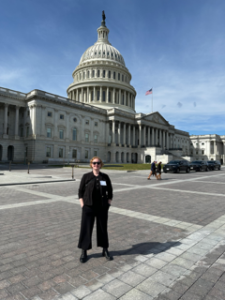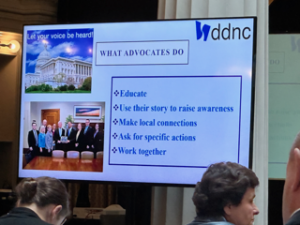Disability | IBD


Kelly outside the Capitol Building
I’ve been very lucky recently to be in a place of strong remission. It’s felt incredible to have the world reopening to me after years of being sick and withdrawn. I have stronger energy, more physical resilience, and mental acuity that I can use without worrying about major crashes or flares. (Part of me wants to end that sentence with “for now,” but I’m going to resist giving in to the constant worries of when my next flare will trigger, for now.)
In this period of remission, it’s been important to me to give back to the IBD communities that have helped and supported me through countless flares and health crises. In addition to blogging for Girls With Guts, I have also been making tentative forays into the world of patient advocacy. I wanted to share more about an opportunity that is free and open to all patients, caregivers, physicians and others whose lives are touched by IBD.
The Digestive Diseases National Coalition hosts a Public Policy Forum in Washington, D.C. every spring. It’s a two-day event with the goal of having patients share their stories with Congressional staff members to influence federal healthcare legislation that can improve and protect the lives of those living with IBD and other digestive diseases. I attended the two-day March 2024 event as a patient advocate, and I’ll share a little more with you about the experience in the hopes that you might also participate in this, or other advocacy events, in the future.
The first day of the DDNC’s program began on Sunday at the Hotel Monaco in Washington, DC, with presentations from industry organizations including, DDNC partners, members of Congress and patient advocates. Sunday’s presentations were crafted to emphasize the critical importance of the DDNC’s legislative priorities so that I could better speak about them on Monday. They also provided training on how to have an effective meeting on Capitol Hill. I met other patient advocates, many of whom had years of experience sharing their stories and working hard to speak out about the importance of protecting patients. An evening cocktail hour was held after the day’s presentations, but I was unfortunately in the grips of a terrible Humira headache and had to head home for the night.
Monday morning started in the Rayburn House Office Building with a wonderful breakfast spread and several award presentations from the Health and Medicine Council (HMC), the sponsors of the DDNC. We were divided into teams based on U.S. region. Teams ranged in size, with the average being about 5-7 patients, and each team was accompanied by a HMC staff member to help them navigate the many buildings and offices on Capitol Hill.
My local team from Northern Virginia, Maryland and DC did not materialize, but I’m a big old extrovert and I was delighted at the opportunity to have more one-on-one time with the congressional aides and staffers on my schedule. The meetings were set up ahead of Monday’s event by HMC staffers, but even then, last minute changes happened to shuffle around the schedule throughout the day. My HMC team lead, legislative associate Matt Bair, and I often stopped by a congressional office to drop off a folder and business card when staff members were not available to meet.

A presentation at the DDNC advocacy training session.
I had took time the week before the DDNC program to practice short sound bites of my personal story that represented how my life’s experiences demanded legislative reform. For example, I’ve had to deal with insurance companies requiring ineffective step-up therapies before approving biologics. I’ve also had my health fail dramatically because of insurance company drug rejections and delays in the unnecessary prior authorization process. I’ve had insurers not cover medically necessary nutrition, and refuse to cover a medication because I had received financial assistance from a drug manufacturer. All of these experiences could be prevented by legislation that was pending in Congress.
I made sure my anecdotes were punchy, shocking and of course, true. Because the difficulties of our lives as IBDers are truly awful and startlingly gruesome, and it’s easy to forget how much of what we live through is NOT OKAY, and how few people really understand the impact of these diseases. Beyond legislative regulation of insurance companies and pharmacy benefit managers (PBMs), the DDNC also asked us to advocate for increased funding for research into IBD. Could it be that some of this money granted by congress might one day help us to cure Crohn’s or Ulcerative Colitis? I was certainly happy to bring that to the attention of the congressional staffers with whom I spoke.
It is hard to know how much of a difference my story had in influencing legislation that could help fellow IBDers. Our meetings were scheduled in the middle of a very strange budget cycle on Capitol Hill, and it felt as though we were asking for things that were much lower priority than what was being discussed in the budget at the time. For example, averting a government shutdown seemed to be a much bigger talking point than asking for funding for the National Institute of Health.
Lobbying and advocating on the Hill is a sort of inscrutable process: did the aides simply put a check mark next to the PRO column beside a bill, tallying up how many constituents had called or emailed about supporting that bill? Was that bill part of a larger power exchange that had nothing to do with the legal implications inside of it, but instead would be used as leverage or collateral between vying factions in Congress? In the end, I came to peace with the fact that I could only control one part of this process: speaking up for what I believed in and making sure my voice was heard by the people who represent me in Congress.
My meetings were lovely, and the staffers were attentive and engaged in the discussion, though I was aware of how important it was to keep things very short because their time was limited. Several times, I was asked questions about specific details of the legislation we were discussing that I didn’t know how to answer, but my team lead, Matt, was able to respond and also take notes that he would follow up on with more information. I collected many business cards, and as a first timer, I made the mistake of not specifically writing down exact questions and topics discussed with each staff member. Though I did follow up with emails reiterating our legislative priorities, next year, I plan on being more diligent with my notes and more personalized with my follow ups!
The day was exceptionally long. I must have walked tens of thousands of steps all over different buildings and offices. I found lovely courtyards to sit in the sun, explored some very clean and excellent bathrooms, ate some great pizza in the basement of the Rayburn Building and shared wonderful chats with my team lead, Matt. Though my legs were jello for a few days after, and I slept for more than 16 hours straight Monday night, I felt so proud of what I accomplished.
 We’re lucky that we live in a country where our voices are counted and our stories matter, whether on Capitol Hill or in our local states and communities. If you are also in a place where you’re looking to contribute your energy and time to your community, I would highly recommend participating in the DDNC Public Policy Forum in the future. And I would encourage you to look into other advocacy and volunteer opportunities with organizations like the Crohn’s and Colitis Foundation, the American Gastroenterology Association, and, of course, the wonderful Girls With Guts! I firmly believe that telling your story can help not only to empower and support those around you with IBD, but also raise awareness of this disease to the greater public to combat stigma and shame, and influence legislators to protect our fellow patients and invest in a safer and healthier future for all of us.
We’re lucky that we live in a country where our voices are counted and our stories matter, whether on Capitol Hill or in our local states and communities. If you are also in a place where you’re looking to contribute your energy and time to your community, I would highly recommend participating in the DDNC Public Policy Forum in the future. And I would encourage you to look into other advocacy and volunteer opportunities with organizations like the Crohn’s and Colitis Foundation, the American Gastroenterology Association, and, of course, the wonderful Girls With Guts! I firmly believe that telling your story can help not only to empower and support those around you with IBD, but also raise awareness of this disease to the greater public to combat stigma and shame, and influence legislators to protect our fellow patients and invest in a safer and healthier future for all of us.
 Kelly Dwyer is a writer, mother, and instructional designer from the Washington, DC metro area who has been living with Crohn’s Disease for 20+ years.
Kelly Dwyer is a writer, mother, and instructional designer from the Washington, DC metro area who has been living with Crohn’s Disease for 20+ years.
You can find her @deviousdwyer or www.deviousdwyer.com.
